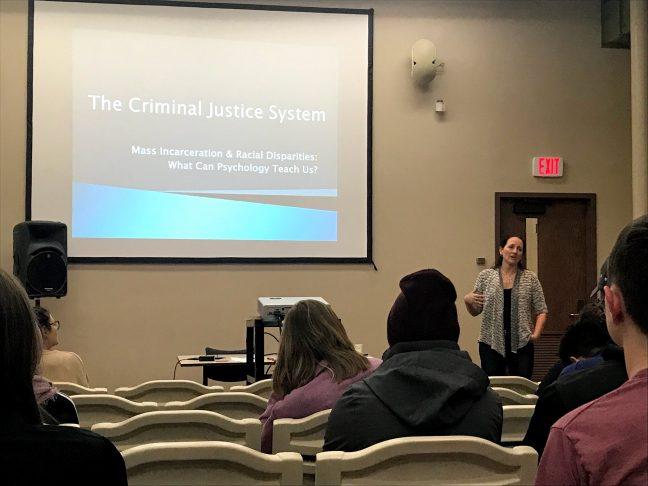University of Wisconsin professor of psychology Patti Coffey led a discussion Monday night about racial disparities in arrests and sentencing in the U.S. criminal justice system.
Coffey touched on mass incarceration and racial disparities. She said incarceration of African American people is much higher than any other race nationwide.
The United States Sentencing Commission found even when committing similar offenses, African American men receive a 20 percent longer prison sentence than white men, while white men are 38 percent less likely to be sentenced to prison, according to data Coffey provided.
In Wisconsin, Coffey said the numbers are even worse. The national average incarceration rate of African American men is 6.7 percent, while Wisconsin’s average is nearly double at 12.8 percent. In comparison, the national average for white people is 1.3 percent, while Wisconsin’s average remains consistent with this statistic at 1.2 percent.
As for Native Americans, Wisconsin’s rate of incarceration averages in at 7.6 percent, which is nearly 4 percent higher than the national average, according to data Coffey provided.
Report finds Wisconsin incarceration rates surpass all neighboring states
“Sixty percent of people in prison are racial and ethnic minorities,” Coffey said.
The juvenile arrest rate is also much higher for African Americans. The legal age to be arrested for a felony starts at 10 years in Wisconsin and it can have significant long-term psychological impacts, Coffey said.
Coffey said both unintentional and explicit biases are exercised in the criminal justice system. Stereotypes affect unintentional biases, which shape perceptions — a reality demonstrated by police officers who choose to pull over one individual over another because of that person’s race or another factor. Conversely, explicit bias occurs when the person performing the bias is aware they are doing so.
There is reason to believe most biases performed in the criminal justice system are unintentional, Coffey said. People act on these biases due to stereotypes that affect their perception, she said.
During the event, Adam Drees, a UW student, asked how people can measure and avoid unintentional bias.
Coffey said measuring bias is difficult, but changing the perception of prisoners is crucial to avoiding it. She said the public must learn to humanize prisoners.
Dane County takes steps forward to address issues within criminal justice system
Changing the language used to describe inmates and avoiding terms like “those people” and “predators” can work to humanize prisoners in the public’s eyes, Coffey said. Coffey also pointed out these terms cannot be applied to everyone.
“These labels activate all kinds of biases and stereotypes,” Coffey said.
Coffey believed changing public perceptions has proven to be a difficult task since stereotypes are still prominent in American society. The media, including movies, reinforces stereotypes, causing people to associate prisoners with crazy, exaggerated characters rather than average, everyday people, Coffey said.
Not a lot of people are aware of their biases or the way prisoners are being treated, Coffey said.
“It’s hard to care about something you don’t see,” Coffey said. “And because you don’t see it, it’s hard to experience it on an emotional level.”


















